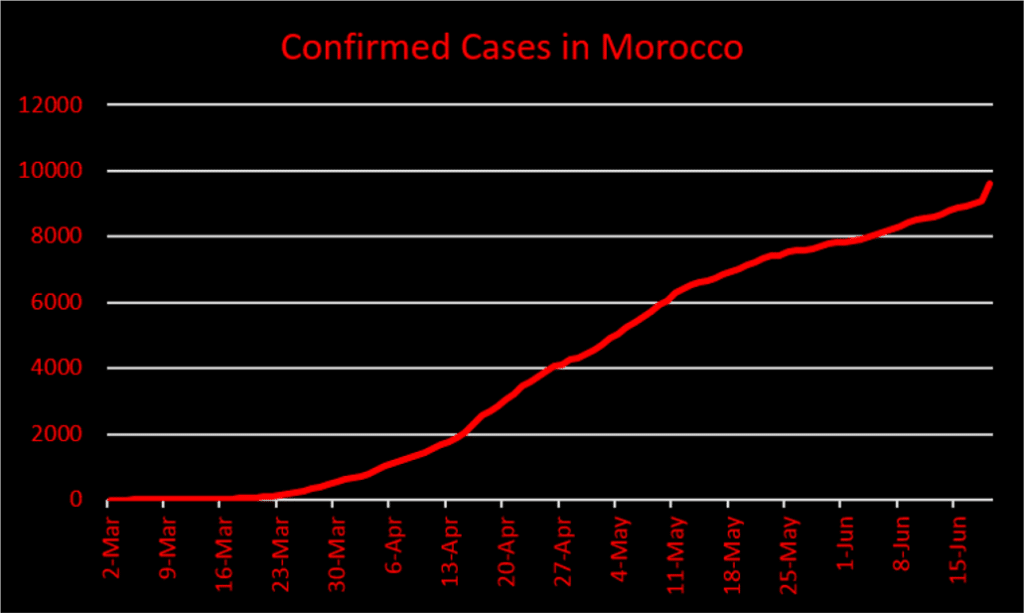June 19, 2020 | Policy Brief
COVID-19 in Morocco
June 19, 2020 | Policy Brief
COVID-19 in Morocco
Although Morocco seems to have escaped the worst of the pandemic with a relatively low number of confirmed cases and deaths, the COVID-19 crisis has devastated the country’s economy. Morocco, which has long been a friend to the United States and a bulwark against terrorism, may need additional outside economic assistance to get back on its feet.
Situation Overview
Morocco confirmed its first COVID-19 death on March 10. The victim was an 89-year-old woman who had recently arrived from Bologna, Italy. Some three months later, Moroccan authorities have reported 9,613 confirmed cases, including 213 deaths.
When the virus hit, Rabat quickly halted travel to and from Italy, banned large public gatherings, and canceled events involving foreigners. Despite these measures, authorities soon confirmed 63 cases of COVID-19 and two deaths, prompting Morocco to declare a national health emergency. On March 20, the government imposed a nation-wide lockdown barring people from leaving their homes except to buy food or medicine. Going to work required a government permit.
Reflecting concern about the lockdown’s impact on the economy, Morocco’s Interior Ministry assured the public that the “health emergency does not mean stopping the economy” and that banks, fuel stations, and other essential businesses would continue to operate. In late March, the European Union stepped in to provide support, offering 150 million euros to help Morocco fight COVID-19. Brussels also said it would try to accelerate delivery of another 300 million euros.
The United States also provided some minor assistance, sending the World Health Organization $670,000 to help contain COVID-19 in Morocco.
Despite the aid and the stringent lockdown, Morocco’s cases continued to climb rapidly throughout May, forcing the government to extend the lockdown until June 10. The government has now started to relax its restrictions, though roughly 40 percent of Moroccans – including those in Rabat and other major cities – remain confined to their homes.
COVID-19 in the Greater Middle East
| Country | Cases | Deaths |
| Iran | 200,262 | 9,392 |
| Turkey | 185,245 | 4,905 |
| Pakistan | 165,062 | 3,229 |
| Saudi Arabia | 150,292 | 1,184 |
| Qatar | 85,462 | 93 |
| Egypt | 50,437 | 1,938 |
| UAE | 44,145 | 300 |
| Kuwait | 38,678 | 313 |
| Afghanistan | 27,878 | 548 |
| Oman | 27,670 | 125 |
| Iraq | 27,352 | 925 |
| Bahrain | 20,430 | 57 |
| Israel | 20,339 | 304 |
| Algeria | 11,504 | 825 |
| Morocco | 9,613 | 213 |
| Sudan | 8,316 | 506 |
| Somalia | 2,719 | 88 |
| Lebanon | 1,510 | 32 |
| Tunisia | 1,146 | 50 |
| Jordan | 1,008 | 9 |
| Yemen | 909 | 248 |
| W. Bank & Gaza | 665 | 3 |
| Libya | 510 | 10 |
| Syria | 187 | 7 |

Data current as of 2:45 PM, June 19, 2020.
Implications
Morocco has fared relatively well compared to countries such as Iran and even some European nations. Still, the virus has taken an enormous toll on the economy. Morocco is expected to suffer a $34.1 billion loss in tourism revenue this year, putting 8,500 businesses and 500,000 jobs in jeopardy. Another problem is the decline in remittances, upon which many families in Morocco rely.
Even before COVID-19, Morocco’s economy had been struggling. As the World Bank recently noted, Morocco “has been on a downward trend for two years,” with GDP growth having “decelerated sharply in 2019 to 2.3 percent, down from 3 percent in 2018.” The IMF now projects Morocco’s GDP to shrink by 3.7 percent in 2020.
What to Watch for
Morocco’s economic recovery can begin in earnest with a full lifting of the lockdown in July. However, the government’s lockdown extension suggests that it may not have the virus fully under control. Given Morocco’s lack of a free press, it is difficult to accurately gauge whether the government’s efforts have in fact stopped the spread of COVID-19.
Morocco’s stability remains a vital American interest. The kingdom has gone to great lengths to counter radical Islam within its territory and across the Sahel and Western Africa. Morocco also regularly hosts U.S. Africa Command’s annual African Lion military exercise. For these reasons, Washington will need to watch for signs of crisis and perhaps take modest steps to bolster Morocco’s shaky finances and help it overcome the COVID-19 crisis.
Benjamin Weinthal is a research fellow at the Foundation for Defense of Democracies (FDD), where he also contributes to FDD’s Center on Military and Political Power (CMPP) and Center on Economic and Financial Power (CEFP). For more analysis from Benjamin, CMPP, and CEFP, please subscribe HERE. Follow Benjamin on Twitter @BenWeinthal. Follow FDD on Twitter @FDD and @FDD_CMPP and @FDD_CEFP. FDD is a Washington, DC-based, nonpartisan research institute focusing on national security and foreign policy.